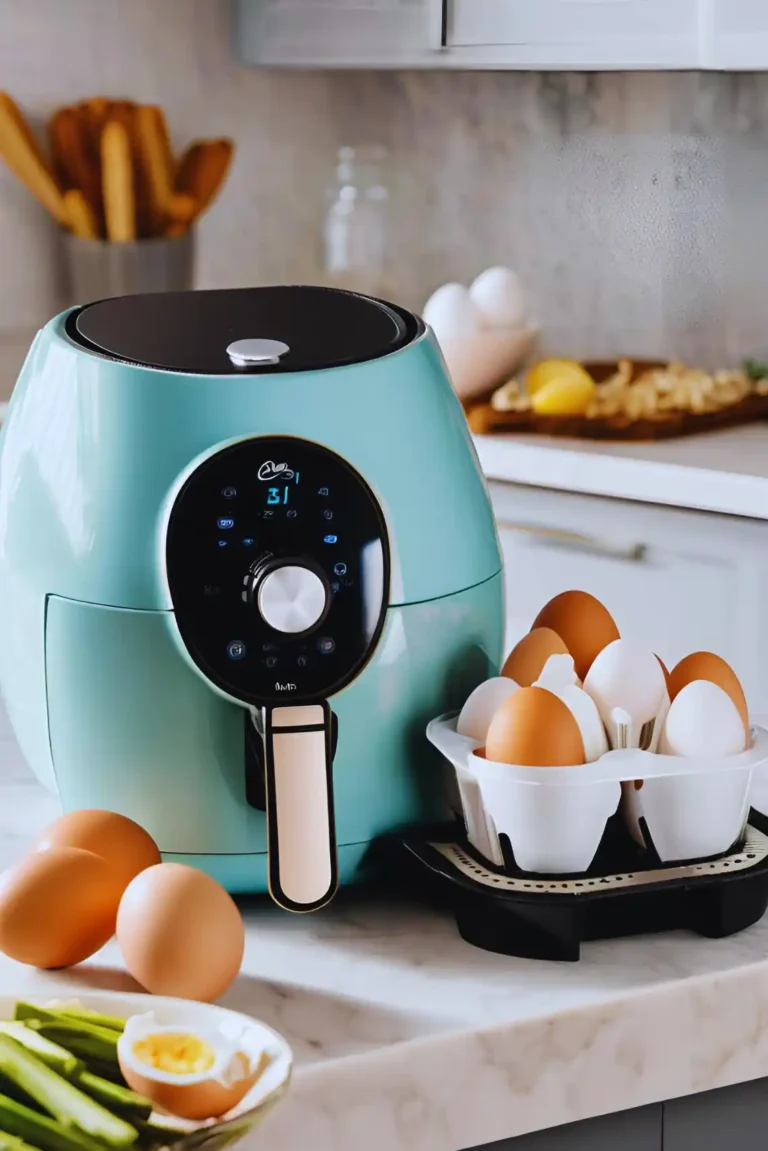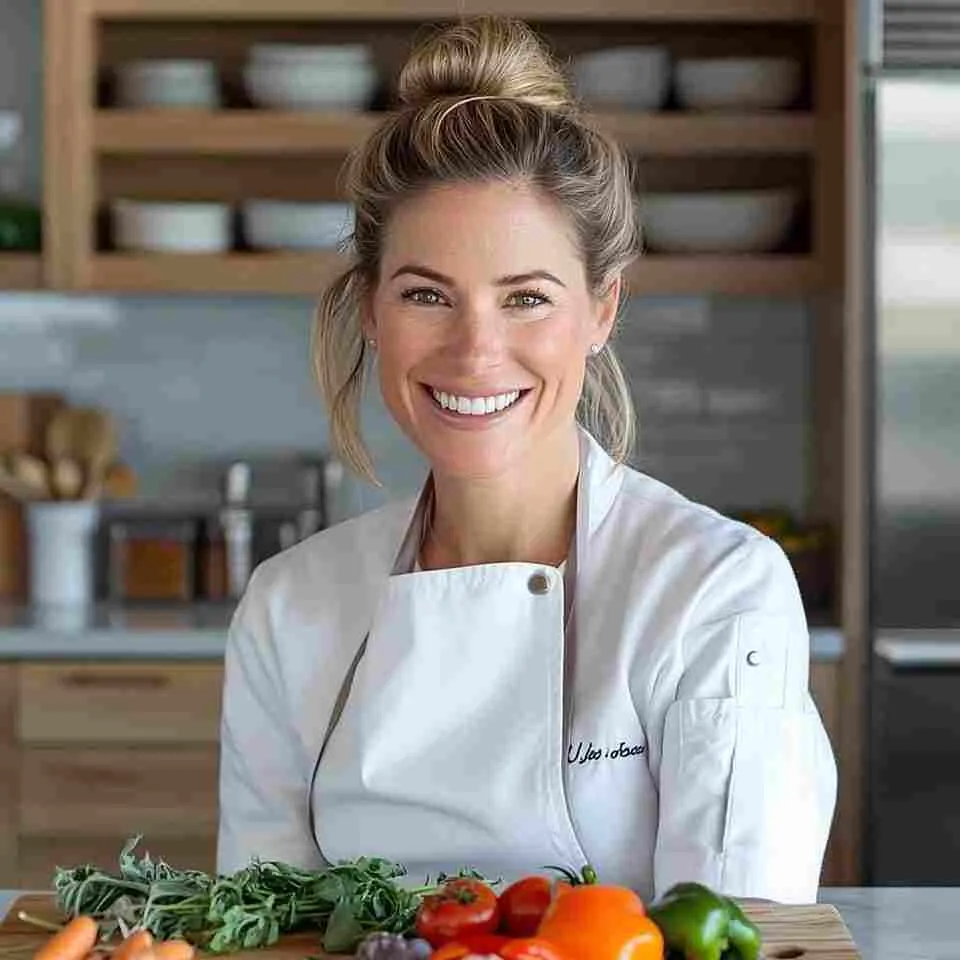Boil eggs in an air fryer—a modern twist on a classic cooking technique. If you’re wondering how this method works or why it’s worth trying, this article covers everything you need to know about boiling eggs in an air fryer. Discover the simplicity of this innovative approach and learn how to achieve perfect results every time.
For more air fryer tips, check out my guide on how to cook fruits in a waffle maker.
1. What Is an Air Fryer and How Does It Work?
An air fryer is a compact kitchen appliance that uses hot air circulation to cook food.
It functions like a countertop convection oven, delivering crisp and evenly cooked results with minimal oil.
The rapid air technology in an air fryer makes it suitable for various cooking techniques, including roasting, baking, and even boiling eggs.
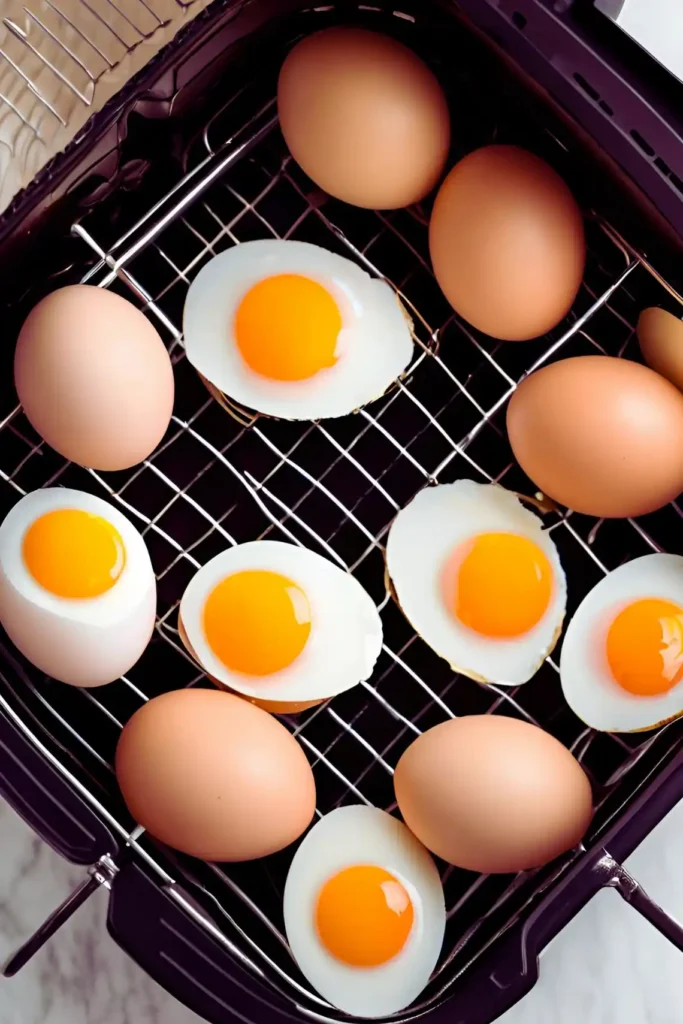
Key Insight: Unlike traditional boiling, air frying eliminates the need for water while maintaining perfect texture and consistency in boiled eggs.
2. Benefits of Boiling Eggs in an Air Fryer
Switching to an air fryer for boiling eggs offers several advantages:
- Convenience: No need to wait for water to boil.
- Consistency: Achieve a uniform texture every time.
- Efficiency: Cook multiple eggs simultaneously without crowding.
- Healthier Cooking: No additional fat or oil required.
Additionally, air fryers are energy-efficient, making them eco-friendly compared to stovetop methods.
3. Essential Tools and Equipment for Air Fryer Egg Boiling
To get started, you’ll need:
- A reliable air fryer with adjustable temperature controls.
- Fresh eggs (preferably room temperature).
- Silicone tongs or a slotted spoon for safe handling.
- A bowl of ice water for cooling cooked eggs.
4. Understanding the Ideal Temperature for Cooking Eggs
The sweet spot for air fryer egg boiling is 200 degrees Fahrenheit. This temperature ensures the eggs cook gently, avoiding overcooking or undercooking. Adjustments may be necessary based on egg size or your air fryer model.
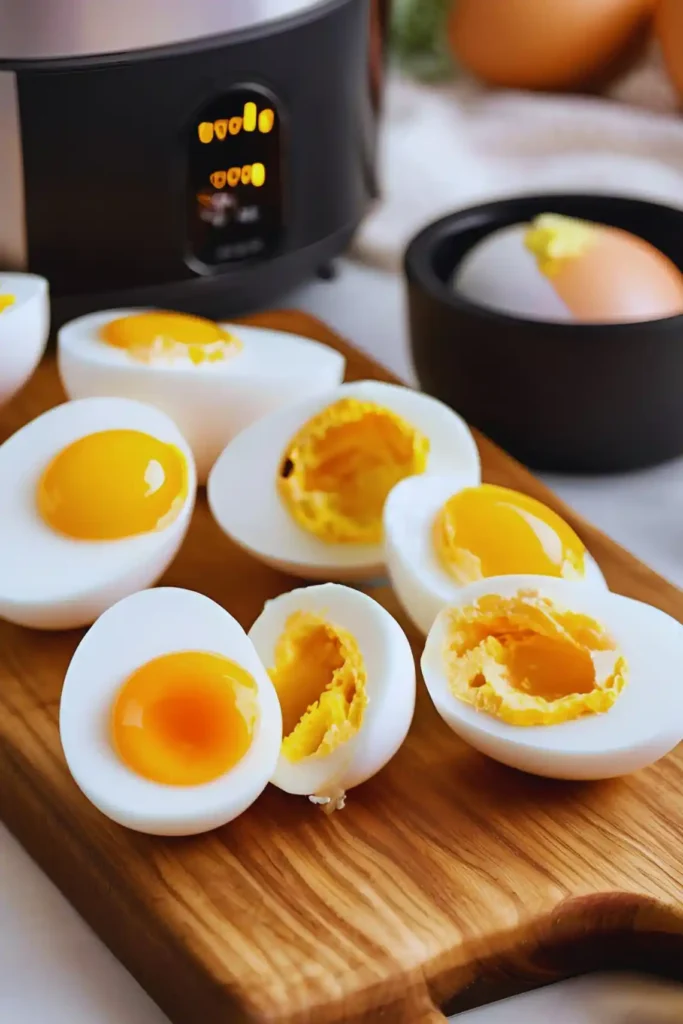
5. How Air Fryer Boiling Differs from Traditional Methods
While traditional boiling uses water to transfer heat to eggs, an air fryer employs hot air circulation. Here’s how the two methods compare:
| Traditional Boiling | Air Fryer Boiling |
|---|---|
| Requires water | No water needed |
| Can lead to cracking | Minimal risk of cracks |
| Involves constant monitoring | Hands-free cooking |
| Cooks unevenly in some cases | Ensures uniform results |
6. Choosing the Right Type of Eggs for Air Frying
Fresh, organic eggs are ideal for air fryer boiling. Eggs with thicker shells are less likely to crack during cooking. If you have older eggs, they may be easier to peel after cooking but might not hold their shape as well.
7. Key Considerations: Temperature, Time, and Egg Size
To achieve the perfect boiled egg:
- Use 200 degrees Fahrenheit as your default temperature.
- Soft, medium, and hard-boiled eggs require different cooking times (covered in Part 2).
- Adjust the time slightly for larger or smaller eggs to ensure optimal results.
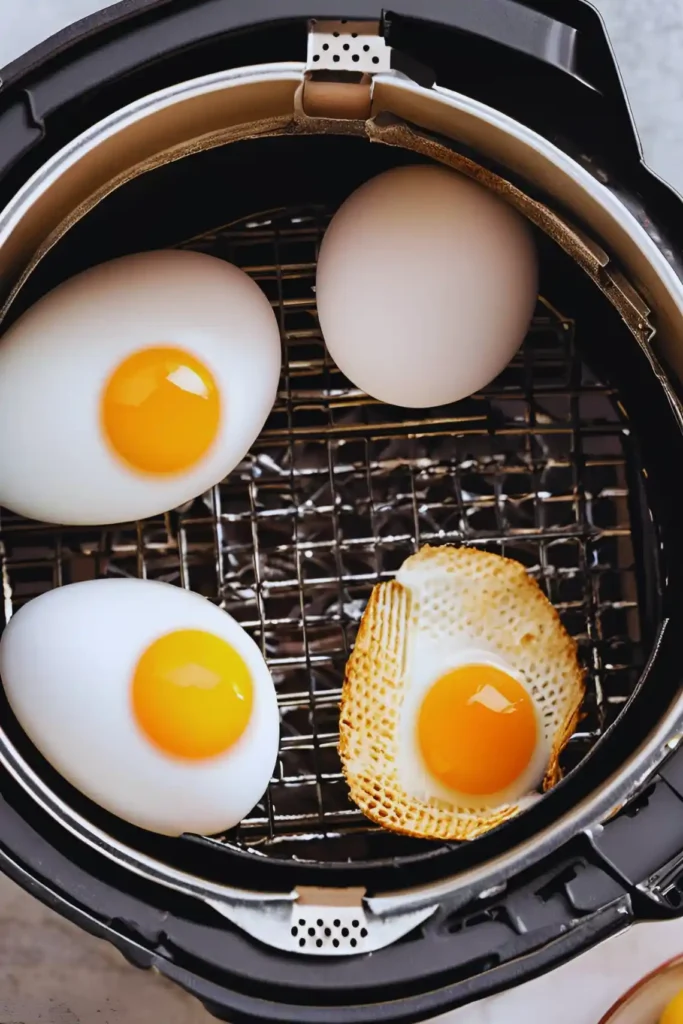
8. Precautions When Using an Air Fryer for Eggs
- Avoid overcrowding the fryer basket.
- Always preheat the air fryer for consistent cooking.
- Handle eggs with care to prevent cracking before cooking.
- Allow cooked eggs to cool before peeling to avoid burns.
9. Common Myths About Air Fryer Cooking
Myth 1: Air fryers are only for frying.
Fact: Air fryers are versatile and suitable for various cooking techniques, including boiling and baking.
Myth 2: Air fryer-cooked eggs taste different.
Fact: Eggs retain their natural flavor and texture when cooked in an air fryer.
10. The Science Behind Boiling Eggs in an Air Fryer
The circulating hot air in an air fryer mimics the heat transfer of boiling water. This ensures the egg whites and yolks cook uniformly. The controlled environment minimizes the risk of overcooking, making it a foolproof method for perfect boiled eggs.
Step-by-Step Guide to Boiling Eggs in an Air Fryer at 200 Degrees
1. Preparing the Air Fryer for Cooking
Before you begin, ensure your air fryer is clean and free from any residual odors or grease. A clean fryer prevents any unwanted flavors from transferring to your eggs.
- Check the fryer basket for proper alignment.
- Lightly spray the basket with non-stick cooking spray to reduce the risk of eggs sticking (optional).
Pro Tip: Use parchment paper liners if your fryer basket has large gaps, especially when boiling smaller eggs.
2. How to Preheat the Air Fryer for Best Results
Preheating your air fryer is a crucial step to achieve consistent cooking. Here’s how:
- Set your air fryer to 200 degrees Fahrenheit.
- Let it run empty for 2–3 minutes to warm up.
Preheating ensures that the eggs cook evenly from the start, preventing hot spots or uneven textures.
3. Arranging Eggs Properly in the Fryer Basket
Placement is key for even cooking. Follow these guidelines:
- Place eggs in a single layer to ensure proper air circulation.
- Avoid stacking or overcrowding the basket.
- If cooking a large batch, cook in smaller batches for best results.
Quick Tip: Use a silicone egg holder for added stability, especially if you’re worried about eggs rolling during cooking.
4. Recommended Cooking Times for Soft-Boiled Eggs
For a soft and runny yolk, cook eggs at 200 degrees Fahrenheit for approximately 9–10 minutes.
Steps:
- Preheat the air fryer as outlined above.
- Arrange eggs in the fryer basket in a single layer.
- Set the timer for 9–10 minutes.
Once cooked, immediately transfer eggs to an ice water bath for 3–5 minutes to stop the cooking process.
5. Achieving Medium-Boiled Eggs: Time and Tips
Medium-boiled eggs, with a slightly firmer yolk, require a bit more time.
- Cooking time: 12–13 minutes at 200 degrees.
- Follow the same steps as soft-boiled eggs but extend the timer.
6. Perfectly Hard-Boiled Eggs in an Air Fryer
For hard-boiled eggs with fully set yolks, cook for 15–17 minutes.
- After cooking, transfer eggs to an ice bath for easier peeling and to prevent overcooking.
- Test one egg after 15 minutes; if not fully cooked, add an additional 1–2 minutes.
7. Tips for Ensuring Even Cooking
- Rotate the basket: Halfway through cooking, shake or rotate the fryer basket to ensure even exposure to hot air.
- Choose similar-sized eggs: Uniform egg sizes ensure consistent cooking times.
- Avoid cold eggs: Bring eggs to room temperature before cooking to prevent cracking.
8. Adjusting Cooking Time for Different Egg Sizes
Not all eggs are created equal. Adjust the cooking time based on size:
- Small eggs: Reduce cooking time by 1–2 minutes.
- Large eggs: Stick to the recommended times.
- Jumbo eggs: Add 1–2 minutes to the suggested cooking times.
Insight: Experiment with your specific air fryer model, as wattage and basket size can slightly affect cooking time.
9. What to Do If Eggs Crack During Cooking
Cracks can occur due to rapid temperature changes or overpacking the basket. Here’s how to manage:
- Preventative measures: Warm eggs to room temperature and avoid overcrowding.
- Post-crack care: Continue cooking cracked eggs as they’re still safe to eat. The texture may vary slightly, but the flavor remains unaffected.
10. Cooling and Peeling Air-Fried Boiled Eggs
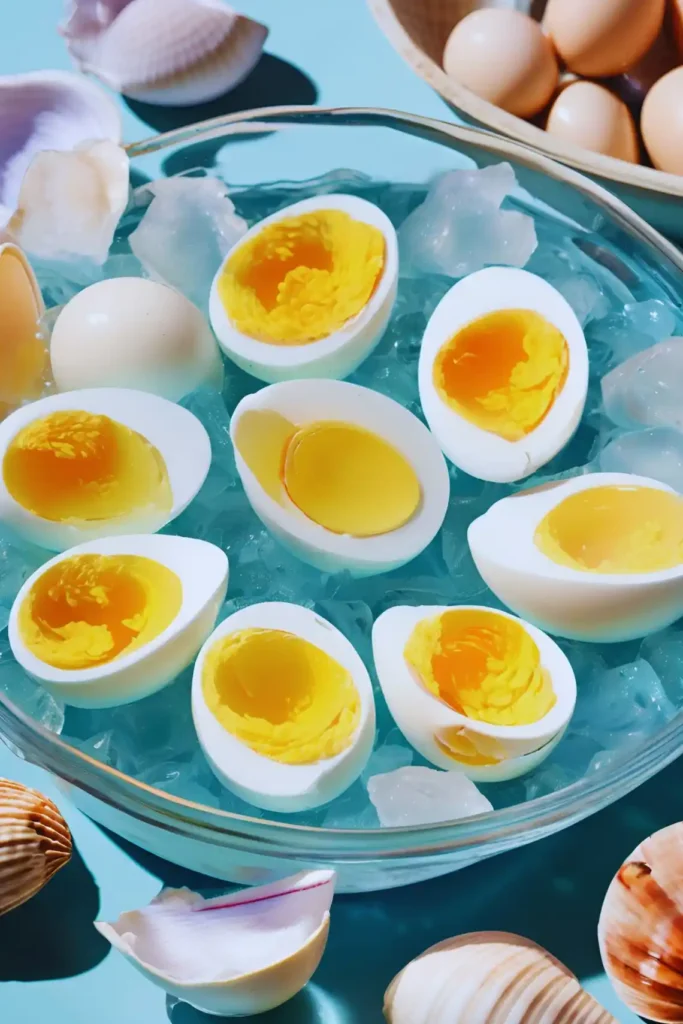
The cooling process is crucial for easy peeling:
- Immediately transfer cooked eggs to a bowl of ice water.
- Let them rest for 3–5 minutes to stop the cooking process.
- Gently tap the egg on a hard surface to crack the shell.
- Roll the egg between your palms and peel under running water for smooth results.
Bonus Tip: Older eggs peel more easily than fresh ones due to reduced egg white adhesion.
Troubleshooting Common Issues
Problem: Eggs are undercooked.
- Solution: Return them to the air fryer and cook for an additional 2–3 minutes.
Problem: Overcooked eggs with green yolks.
- Solution: Reduce cooking time and immediately cool eggs in an ice bath.
Frequently Asked Questions
1. Can You Overcook Eggs in an Air Fryer?
Yes, overcooking eggs in an air fryer is possible, resulting in rubbery whites or a green-gray ring around the yolk. Overcooking occurs when eggs are left in the fryer for too long or at a temperature higher than 200°F.
How to Prevent Overcooking:
- Monitor the cooking time carefully.
- Use an ice water bath immediately after cooking to halt the process.
2. Why 200 Degrees Is an Optimal Temperature for Eggs
Cooking at 200°F ensures a gentle and controlled cooking process. This temperature allows the egg whites and yolks to cook evenly without becoming rubbery or dry.
Why It Works:
- Prevents overcooking of yolks.
- Reduces the risk of cracking due to sudden heat exposure.
- Maintains a consistent texture across different egg sizes.
3. What to Do If Eggs Turn Out Undercooked
Undercooked eggs can be salvaged without starting over:
- Return the eggs to the air fryer.
- Set the timer for an additional 2–3 minutes.
- Check for doneness before serving.

